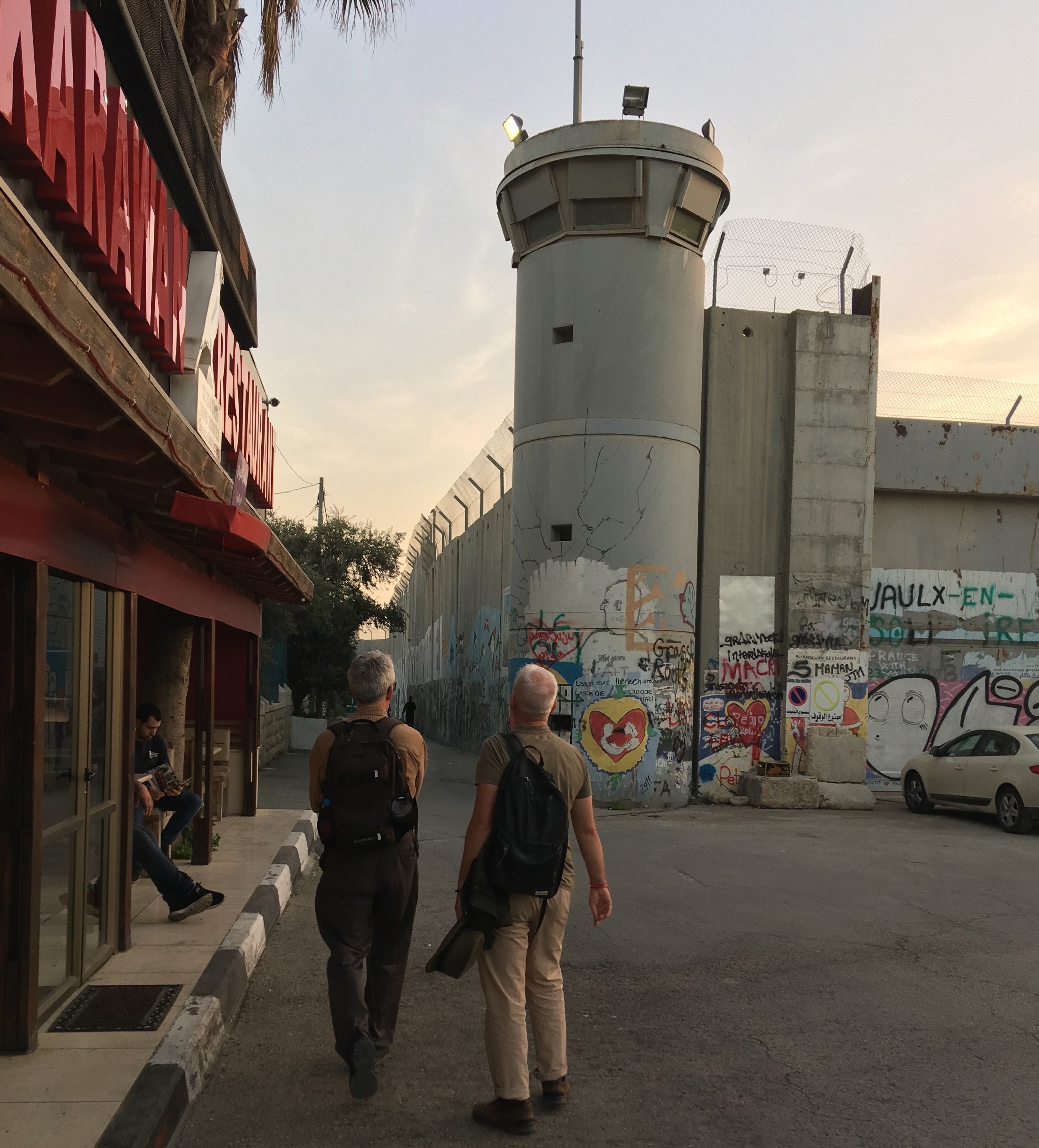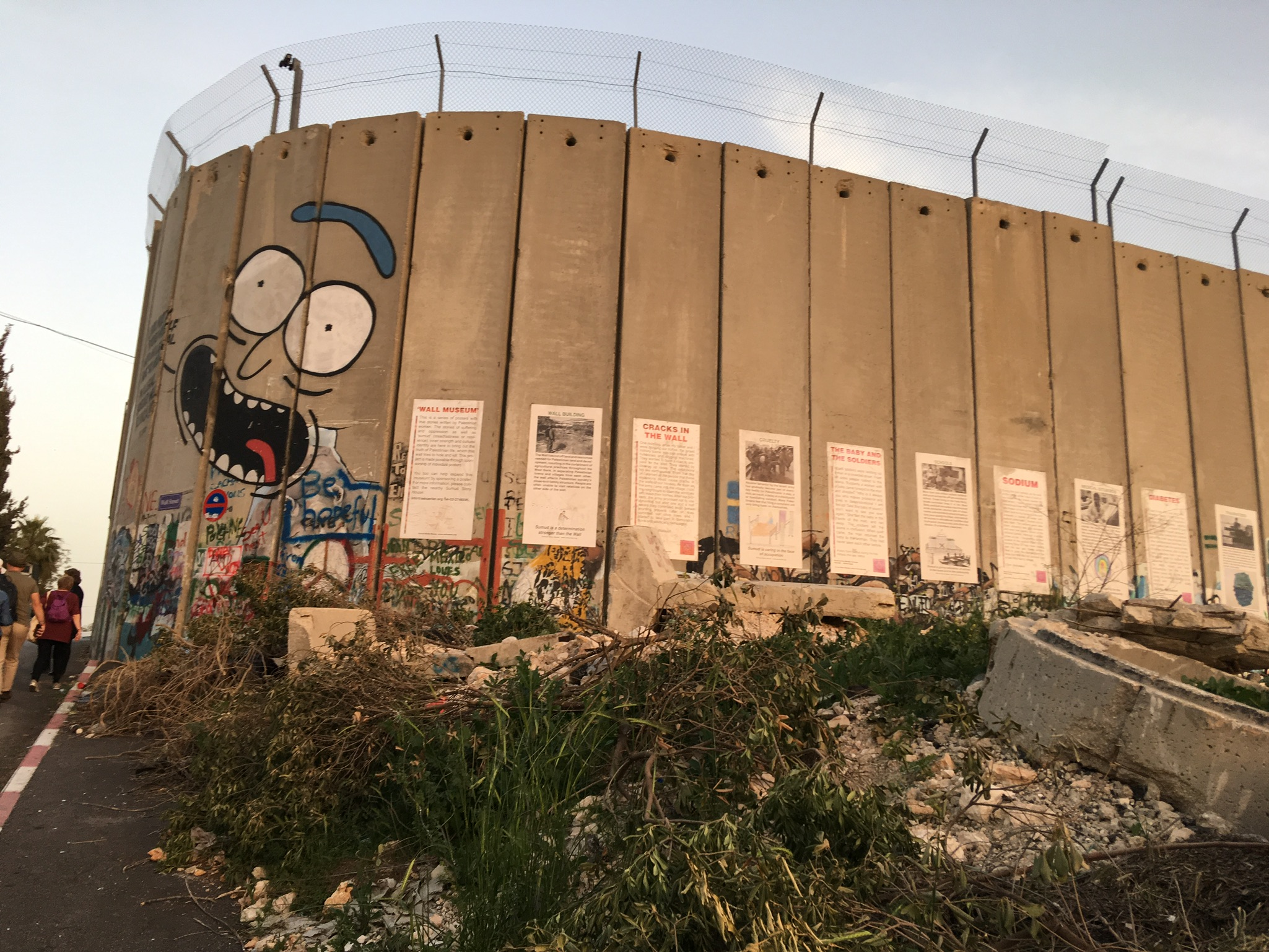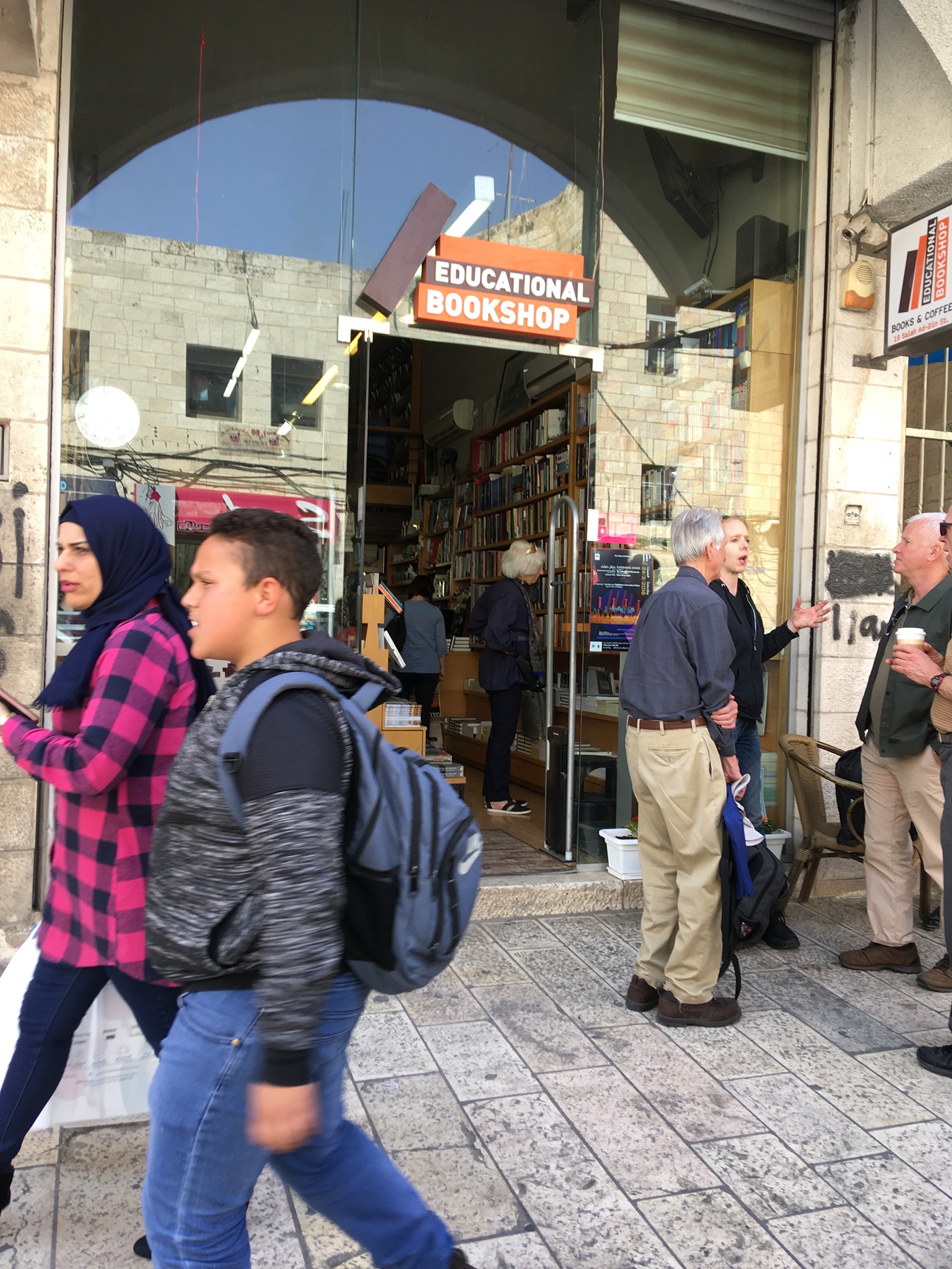Mental Health in Palestine and Israel - connection and disintegration
By Rachel Young
I went to Palestine in March 2018 on the Study Tour organized by the Israeli Committee Against House Demolitions (ICAHD) and aimed specifically at Mental Health Professionals.
I wanted to learn about the situation in Jerusalem and the West Bank and to show solidarity with the Palestinian people. My particular curiosity was to understand, given the history of persecution that Jewish people have experienced, how ordinary Israelis mentally and emotionally accommodate their government’s treatment of the Palestinian people into their psychological framework.
My visit gave me some clarity regarding psychological ‘strategies’ which allow people to behave in an inhumane manner towards other people both at an individual and governmental level. I also gained insight into how the occupied communities sustain life under inhumane conditions and how they struggle to be seen and heard in the world arena.
The 1947 Nakba was an horrific event. In two years the Israeli Zionist forces had displaced 750,000 Palestinians from their homes, killed 15,000 Palestinians in mass atrocities – razing their villages to the ground. This was in essence ethnic cleansing, which is ongoing as the Israelis advance taking ever more Palestinian land and Palestinians continue to resist in every way they can.
Of course, there are some mental illnesses that are physical or chemical – but most mental illness is attributable to trauma, neglect, cruelty, or social/cultural ‘disease’. It is fashionable to focus responsibility for mental health on the individual. Why are they depressed? Anxious? Neurotic? Obsessive? What can they do to get better? The truth is that very often they are expressing their relationship with the world around them. Their mental state is a reflection of the world they inhabit. If the world they lived in was healthy, they would reflect that health.
THE IMPACT ON ISRAELI YOUNG PEOPLE
The average Israeli has a strong sense (whether conscious or unconscious) that the action of their government is wrong. Displacing a nation is impossible to do in secret. On some level people know what is going on. In individuals this results in low grade paranoia. This mentality is fed and watered by Israeli propaganda. Israeli children are fed stories of the Arab bogie man (and woman). A whole people has been dehumanised and Israelis feel cornered and threatened, and therefore justified in attacking.
Going through National Service is one very powerful way that the Israeli authorities indoctrinate their young people and make them complicit in the crimes of their leaders. Although young people might enter the army believing that they will be peace keepers and provide a caring paternalistic presence (and not all do), they are soon made to commit acts which force them to emotionally detach themselves from the humans they are violating. Young people are on all the checkpoints harassing and intimidating. They have such power over people who in any sane society would be their elders and betters in terms of experience and wisdom. They become so detached from reality that it becomes ok for them to lift up the skirt of a young Muslim woman with the barrel of their rifle to check for knives and guns. These are everyday humiliating experiences for Palestinians going through checkpoints and going about their daily business.
The indoctrination process breaks down, however, when soldiers are themselves traumatised by the barbarism they are commanded to inflict. The Breaking the Silence website (https://www.breakingthesilence.org.il/) is a powerful testament to the human spirit. Israeli soldiers, who have been through the experience of conscription often want to tell their story, are sometimes brave enough to stand up to the dangers involved in speaking out and go on record on this website.
DEHUMANISATION OF PALESTINIANS
Dehumanisation is an essential part of the process of persecution. Human beings do not normally accommodate killing their brothers and sisters. The Israeli authorities have to un-person the people they are persecuting. The policy of systematically rubbing out Palestinian culture, history, language, identity is part of their attempt to eradicate a whole people.
An example is the Palestine Educational Bookshop in Jerusalem. This was established in 1984 but now is called the Educational Bookshop because the name Palestine is now not permitted to be displayed publicly. The bookshop offers a space for Palestinians to meet, discuss and learn about their heritage and struggle.
When experiencing the extreme fear and anxiety of paranoia and a closed system of belief, individuals and groups must completely separate themselves from the understanding that they are doing wrong. They cannot accept the evidence of what their government is doing. What results is an extreme version of the world where they are completely right, and the other is completely wrong, a complete distortion of reality. Some Israelis we met expressed a complete negation of the reality of Palestine. One man told me that I was believing a lie. “There was never,” he said, “a Palestinian people. There was nobody there in the desert when we came. We created life where there was nothing.” This was his absolute belief. If there was nobody there it follows that they could not have been massacred, they could not have been displaced and they are not now living in exile.
There is resistance within Israel too, but it is not in good shape. PsychoActive is an organisation of Israeli therapists who are activists. They were nervous at meeting us because they feared our judgment. They carry an enormous weight of guilt on behalf of their society. The opposition to the status quo is weak and getting weaker. In the past there were more demonstrations and a stronger left-wing presence. The activists we met feel a sense of hopelessness is creeping in. Their appreciation of the Israeli national psyche as split and numbed to reality helped in my understanding of how ordinary people organise their emotional responses to the situation.
Mental health issues that I observed in the West Bank: traumatisation, depression, anxiety, abandonment of hope – states of mind that reflect the conditions. In the West Bank, people have no right to freedom of movement outside the West Bank. To find work, they must apply for permits to travel beyond the checkpoints into Israeli territory. Anyone who has any kind of record of resistance will not be issued with a permit and so will find it very hard to earn a living. The standard of living in the West Bank is higher than in Gaza and the level of threat lower, but it is still very obviously an occupied territory, with a high army presence and overt intimidation and control.
The system that the Israeli authorities have imposed on the Palestinian people harshly limits their freedom of movement and creates divisions between them. No Palestinians have passports. They have to apply for each and every trip that they make abroad. They are subjected to the classic strategy of divide and rule. They are placed into tiers of status depending on where they live.
Palestinians are second class citizens in Jerusalem. They have access to Israeli health and education services and pay taxes (although they refuse to vote or legitimise Israeli rule over them). But their life is a daily struggle, they are ghettoised and targeted by the police, army – and the Israeli population.
People in the West Bank must apply for permits to build or adapt their houses, which are mostly refused. If they go ahead and build without permits on their own land or adapt their properties to allow for the overcrowding they are experiencing, the Israeli authorities can and do come and bulldoze their houses.
The West Bank territory is constantly being reduced and people squeezed into increasingly overcrowded refugee camps. It is surrounded by the infamous wall, 26-feet high, punctuated by watchtowers. Israeli patrols enter at will and terrorise the population, particularly those that are close to the Jewish settlements which are predominantly placed at the top of hills, intimidating the Palestinian communities. In Hebron they have had to put netting over the streets to protect them from the filth and rubbish that Israeli settlers throw down.
The population of Gaza live in even worse conditions. They have practically no freedom of movement. They are mostly limited to staying within the confines of Gaza, a territory that is devastated, horribly polluted, embargoed, with few facilities or communication apart from what is allowed through the checkpoints by the Israeli authorities.
The Arab Counselling Service in Jerusalem (Palestinian identity is not allowed - the word ‘Arab’ is used throughout Israeli territories to denote Palestinians and is a term of abuse) was a beautiful oasis of tranquillity – but the workers there are in a war zone. In a Q and A session with some of the therapists there one of our group asked how they managed their own self-care. With a wry smile, the leader explained that the whole community is in a state of constant trauma. This is not Post Traumatic Stress Disorder – this is constant and ongoing. There is no let up, there is no rest: children terrorised by tear gas and house invasions, house demolitions occurring randomly, children being arrested and separated from their families. They are beyond burn out.
We met human rights lawyers who described their attempts to hold the Israeli authorities to observe International Law with regard to arresting children. The Israeli authorities break international law in almost every case. Children are targeted who have leadership qualities. Their homes are invaded in the middle of the night and they are arrested. They are separated from their parents and held without charge, often without food, in the cold. Often they will be taken in with their friends and then told that their friends have informed on them. They are told they will be released with no harm if they inform on their community. Their mothers and sisters are threatened with rape if they do not collaborate. This has been going on for decades. The children arrested and coerced 20 years ago are still informants today. Every community is aware that they have been infiltrated for years. Everyone suspects everyone else. This is the psychological control that Israel exerts.
HOW DO THE PALESTINIAN PEOPLE SURVIVE?
Firstly, Samud which means steadfastness - Palestinian resistance. Palestinians oppose the illegal oppression of their people at every opportunity. The principle of Samud underlies everything that people do to survive and protest.
Secondly, we witnessed a strong sense of community. At the Arab Counselling Service the team involved the children in a research project about what they want and need – what are their perspectives and priorities are and then involved them in meeting their own needs. They do not see counselling and psychotherapy as something that is ‘done to’ victims but rather something to promote growth and development. This approach of fostering self-sufficiency in the next generation takes the long view and is building for a possible future.
Thirdly education is a priority. There is a high proportion of very highly educated and qualified Palestinians. People we met were highly motivated to pursue any opportunity to further their education in spite of constant harassment, obstacles, and financial difficulties.
Over and over again I was bowled over by the dignity and maturity of all the individuals we came into contact with and with the calm adult manner in which they respond to the continuous harassment and oppression, not allowing themselves to be baited into reacting, but rather consistently and intelligently meeting the enormous challenges of life with skilful creativity and courage.
Birzeit University is a Palestinian run university where the students are doing their best to be young people in the midst of an occupation. The work that Rita Giacaman’s department does is an integral part of the community. They take their research out to the community and create projects which gather data and help people at the same time with a view to expanding Palestinian influence in academic circles worldwide. Rita’s perspective is laid out in her article ‘The Wounds Inside’. She concludes:
“Our journey in the process of investigating the effects of war on health has revealed the need for a reframing of the causes and health consequences of exposure to political violence
by placing the concept of suffering at the core of the health paradigm, and by adding a political domain as the ultimate determinant of population health. This reframing is essential to really understand what war does to people. It is also essential to guide relief operations and humanitarian assistance, and to support initiatives intended to mitigate the effects of war on health. For too long, Palestinians have been the recipients of aid in response to their plight, a plight that seems to have no end in sight. Yet, what Palestinians really need is . . . a recognition of the injustice that befell them when with the Balfour Declaration the British decided to give a land they did not own to people coming from elsewhere, and when the United Nations agreed to partition Palestine despite the severe injustice to Palestinians this entailed, with the consequent creation of a tragedy that continues to this day: the question of Palestine. Palestinians do not want charity, or medications and therapies to help them withstand injustice. While it is true that humanitarian assistance and relief operations are needed in times of chronic crises, those must be coupled with a serious attempt at resolving the root causes of ill-health, which, in the Palestinian case, requires a sociopolitical resolution: justice, freedom, sovereignty, and self-determination before good health and peace can be achieved”

Watchtower

Part of the apartheid wall

The Educational Bookshop, Jerusalem






